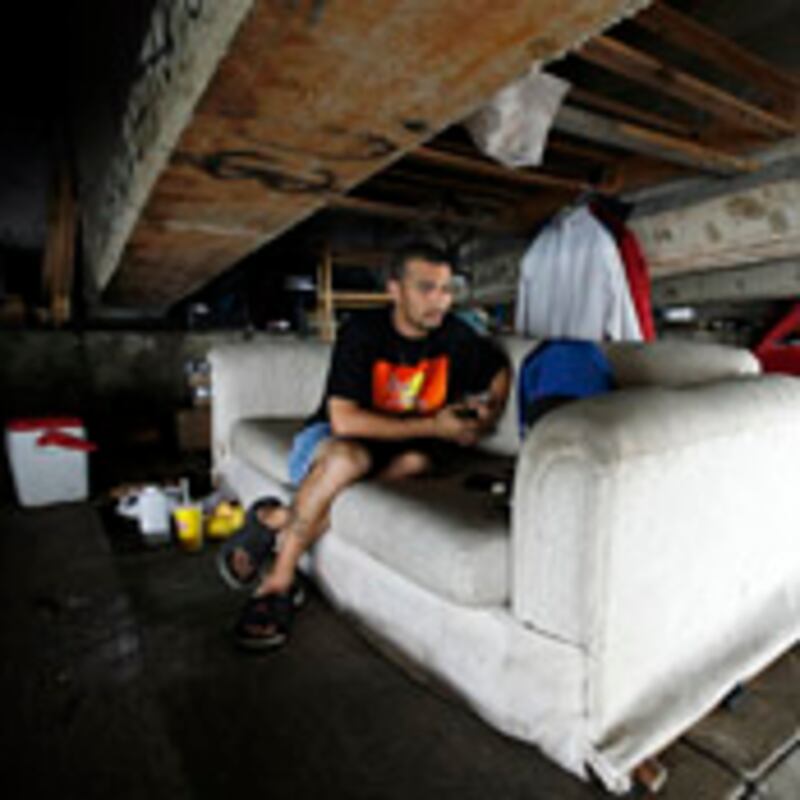
Is federal stimulus money being doled out to convicted sex offenders? Yes, at least if you happen to be a felon registered in Miami-Dade, one of the country’s hardest-hit regions in the ongoing recession.
The county’s Homeless Trust is using the money—part of $7.5 million from the U.S. Department of Housing and Urban Development set aside for homeless people in the county—to relocate dozens of sex offenders who have made an encampment under the Julia Tuttle Causeway their home. Convicted sex offenders who meet income requirements are eligible and can obtain money to cover rent, housing, and utilities for up to 18 months.
“I don’t think that those convicted of sex crimes should have any priority before regular, decent citizens who have fallen on hard times.”
The bridge dwellers have been an international embarrassment for Miami, attracting reporters from the BBC to German TV to a Russian talk show. “It’s been a black eye,” admits Jose “Pepe” Diaz, the vice chairman of the Miami-Dade Board of County Commissioners.
Miami has one of the strictest ordinances for convicted sex predators, banning them from living within 2,500 feet of schools, playgrounds, parks, day-care facilities, and many other public places, including even most libraries. The rule means it’s impossible for any sex offender to live in Miami Beach and most affordable parts of Miami itself. Although the state law requires only a 1,000-foot exclusion, Miami had passed the wider ban in 2005 in the wake of public outrage over the murder of 9-year-old Jessica Lunsford, who was kidnapped and brutally killed in the county by a convicted sex offender.
While the 2,500-foot exclusion rule is being challenged by the American Civil Liberties Union, Miami and Miami-Dade government officials have urged the state to remove the felons (through a hodgepodge of state regulations, the area beneath the bridge is under the jurisdiction of both the Departments of Transportation and Corrections). Until earlier this year, the homeless, who had been moved there in early 2007 by probation officers who could find no other place else for them to live, were set up in conditions that were barely habitable. They were issued ID cards or driver’s licenses by the Department of Motor Vehicles that listed their address as being under the causeway.
I have visited twice. From a distance, the area looks like a colorful tent and cardboard shantytown. But it takes only a few minutes of walking around the bug-infested grounds, without running water or toilets, to realize how filthy it is. Trucks, cars, and buses thunder overheard, while several boomboxes blasting Spanish songs compete for attention. The stench is especially unbearable in Miami’s humid summer. One tent had a padlock on the front, a visible if not effective request for some privacy. Some of the men, and at least one female offender, wear ankle straps as part of their parole. On my first visit, one offender seemed to have an infection around the metal strap, but had not yet been seen by a doctor. A couple of the camp’s residents were in their early 20s, one with all gold grills on his teeth. The oldest man I met, stooped over and feeding some cats, said he was 83.
Since the camp’s inception, there were concerns that once sex offenders became homeless or are allowed to drift without a fixed address, public notification of their whereabouts becomes virtually impossible. And forcing sex offenders to live in squalor, removed from the stability of their families, increases the likelihood they will commit more crimes. Last year, one bridge dweller, Ellius Hayes, was arrested for first degree murder. Another offender was charged with fondling a young girl. As the public maelstrom grew, the ACLU sued Miami, charging it was complicit with the state in forcing the offenders to live in the encampment. Miami also sued the state last year, thus far arguing unsuccessfully that the homeless colony was too close to a public park—Picnic Island No. 4—a remote, tiny island in Biscayne Bay accessible only by boat.
Ron Book, chairman of Miami-Dade’s Homeless Trust, has worked tirelessly to relocate the sex offenders. Book is no bleeding-heart liberal. His government agency’s brief mission statement is “To eliminate homelessness in Miami-Dade County,” but his own daughter, Lauren, was sexually assaulted. “She was molested, raped, and pillaged by a piece of garbage now spending 25 years in prison,” Book told me. As a result, it was Book who was one of the authors for the 2,500-foot rule. Now his job at the Homeless Trust leaves him with the problem of finding housing for the sex offenders who are on the street.
He’s taken ads out in The Miami Herald in recent weeks, seeking owners of local housing units. With one of four properties in Miami-Dade in foreclosure, and real estate values and rental fees plummeting, suddenly some landlords are interested. Even single-family homeowners have expressed interest. Book has looked at almost 100 properties that could possibly house the Julia Tuttle offenders. Using the stimulus money, Book will pay for the first and last month’s rent at every offender’s new apartment, and could pay for more if needed. All the felons have to do is be recertified every 90 days. And in some cases—as with that of a sex offender husband and his non-offender wife—Book has already found housing.
In the last few weeks, the number of homeless under the causeway has dropped from an estimated high of 124 (a census was done in August by the police and parole officers) to about 50.
Not everyone is a fan of spending stimulus money on convicted sex offenders. “I appreciate what Ron Book is trying to do in a very difficult situation,” Jose “Pepe” Diaz told me. “But I have reservations about how that money is being used. There is a terrible nationwide problem of increased homelessness among hardworking people who were just keeping their heads above water until the recession hit. I recently found a heartbreaking case of a mother who had lost a job, and she and her three children were living out of her car. I don’t think that those convicted of sex crimes should have any priority before regular, decent citizens who have fallen on hard times.”
“I have no love for sexual predators,” Book told me. “But under the law, we can’t do a background check on anyone. As a result, we don’t only have convicted criminals, but foreign nationals slip into our system and get housing assistance. We can’t check on them and we can’t discriminate. So it’s first come, first serve, and if the first ones who get here are the sex offenders, they’ll get the money. And in any case, people shouldn’t be living under a bridge in those conditions.”
Gerald Posner is The Daily Beast's chief investigative reporter. He's the award-winning author of 10 investigative nonfiction bestsellers, ranging from political assassinations, to Nazi war criminals, to 9/11 and terrorism. He lives in Miami Beach with his wife, the author Trisha Posner.






